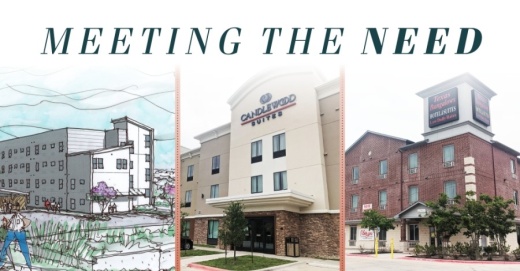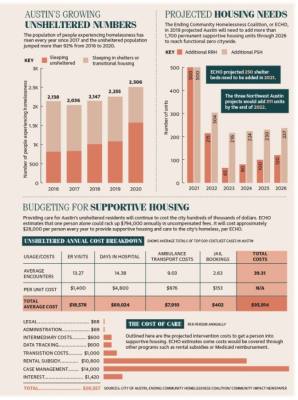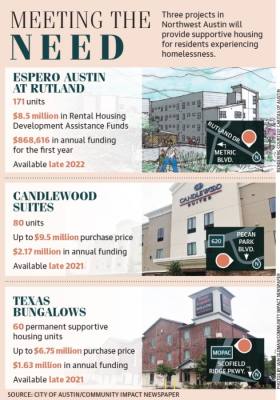Local advocates for housing-first policies state the three projects—Candlewood Suites, Texas Bungalows and Espero Austin at Rutland—are a substantial step forward in finding humane and practical solutions to Austin’s homelessness crisis.
“When you’re getting people into housing, they have a roof over their head. They have stability. ... They are out of the elements, so then they can start working on those next challenges and goals that they are going to address,” said Phil Leal, director of mobile services and outreach for local homelessness nonprofit The Other Ones Foundation.
But business owners and homeowners neighboring Candlewood Suites off Pecan Park Boulevard—which Austin City Council voted in February to purchase for up to $9.5 million—are pushing back in a coordinated effort to block the sale.
After a series of press conferences and public outcry, Williamson County announced in early April it is filing a lawsuit against the city of Austin in order to block the redevelopment of the property into permanent supportive housing units. In early March, Chaudhari Partnership—an ownership group that runs Hampton Inn & Suites and Homewood Suites off Pecan Park Boulevard—filed a lawsuit against the city, also seeking to block the supportive housing project.
At the crux of the lawsuit, local business owner Rupal Chaudhari said she is concerned about the impact the Candlewood Suites proposal will have on her business—a neighboring hotel.
“Permanent supportive housing brings drugs and mental illness. We are concerned it will drive our business away,” Chaudhari said. Hotels for housing
The Candlewood Suites housing project, which is undergoing a 90-day due diligence period, is facing stiff opposition from local business owners and elected officials.
Candlewood Suites shares a parking lot—and an address—with the neighboring Hampton Inn & Suites, which Chaudhari’s family owns. To Chaudhari, that represents a problem.
“Why would [customers] want to stay at a hotel next to permanent supportive housing?” Chaudhari said.
The hotel owner and other nearby business owners, including Freda Cheng of Freda’s Seafood Grille, formed a coalition to raise public awareness about the supportive housing units.
According to Chaudhari, the group is asking to delay the purchase of the hotel and post a public notice of the transaction. Further, it wants the city to hold a public hearing for the purchase and conduct and publish a study about the impact the supportive housing units will have on nearby businesses and homeowners.
Cheng contends the city hastily bought the property without first analyzing if it is ideal for a supportive housing development.
“It is the wrong place to purchase. There is no transportation. There are no jobs,” Cheng said. “I don’t see how the city is going to support them.”
The closest Capital Metro bus stops for the MetroBus 383 line are less than a half mile south of Candlewood Suites. A Walmart on the other side of US 183 is the closest grocery store to the site, just under a mile away.
The option to purchase the Candlewood Suites property first came to council Jan. 27, the same day it voted to acquire the Texas Bungalows. That building, just off MoPac and north of Scofield Ridge Parkway, will add up to 60 permanent supportive housing units to the city’s roster. The purchase was proposed simultaneously to the purchase of the Candlewood Suites but received no objections from council.
One week after the vote to purchase Texas Bungalows, council voted to acquire the Candlewood Suites building. Mackenzie Kelly, who represents Northwest Austin’s District 6 on the dais, was the lone dissenting vote in that decision.
The new council member said she would have liked more time to hold town halls with nearby residents before the final vote on the Candlewood property.
“A weeklong delay was not nearly enough time to properly get the word out about supportive housing,” Kelly said.
As Williamson County officials held press conferences in protest to the Candlewood Suites activity, and as state legislators filed bills to prevent cities from making similar purchases in the future, a supportive housing development years in the making was quietly approved in North Austin.
Nonprofit leads effort in North Austin
In March, the Texas Department of Housing and Community Affairs approved a tax credit for Northwest Austin’s third supportive housing project—Espero Austin at Rutland. The approval marked the end of a yearslong process to get the project off the ground for Caritas of Austin, a local nonprofit that has helped to coordinate care for people experiencing homelessness in Austin since 1964.
Espero, achieved in partnership with the city of Austin and development firm The Vecino Group, will be the first housing development that Caritas owns and operates. In the past, the nonprofit has connected its clients to housing solutions throughout the city, but now it will coordinate with the Ending Community Homelessness Coalition, or ECHO, and the city to place prioritized residents in its units when Espero opens in late 2022.
Once residents are housed, Espero will have support staff on-site at all times, according to Caritas President and CEO Jo Kathryn Quinn. The nonprofit’s case managers will help its residents connect with a personalized slate of services, including substance abuse treatment, behavioral health care and domestic violence aid.
“What we know about the population of people experiencing homelessness [is] there is a broad range of needs,” Quinn said. “We do not operate from a ‘one size fits all’ mentality. We know that doesn’t work.”
Espero will also house workforce development training and an employment program on-site to help its residents secure and maintain employment in the surrounding neighborhood.
Quinn said the site’s proximity to upcoming development and ample retail and restaurant job opportunities—the site is about 1 mile southeast of The Domain—was one of the primary reasons Caritas pursued the North Austin property for Espero.
Leal with the Other Ones Foundation calls this level of support for residents receiving supportive housing “wraparound services.” Establishing these services before relocating people off the street, Leal said, is crucial to finding any success after housing.
“Simply getting someone into housing is not the end of the road—there is still a person that has a life to live,” Leal said. “The supportive wraparound services of medical treatment, mental health treatment, substance use treatment—and having low-barrier access to that—is definitely key.”
City documents show that these annual services will cost about $868,000 annually. Quinn said she does not have a “contract in hand” with any entities yet to cover those costs, but she also said the nonprofit is currently running a philanthropic campaign to raise money for the services. Further, Caritas is looking to secure federal funding available from the U.S. Department of Housing and Urban Development, and the nonprofit is holding talks with the city of Austin about funding opportunities. Growing cases of homelessness
When it first opens to residents in late 2022, Espero will begin housing people in a part of Austin with a fairly large population of unsheltered homeless residents.
Every year, ECHO and volunteers citywide conduct a head count to identify how many residents in Austin are experiencing homelessness on a single given day, known as the point in time count.
According to the 2020 ECHO point in time count, the 78758 ZIP code had approximately 150 unsheltered residents experiencing homelessness.
While the three upcoming supportive housing projects will help to house residents experiencing homelessness in Northwest Austin, advocates say more units are needed across all parts of the city. Leal said displacing residents by moving them to the other side of the city can result in additional trauma and serve as a roadblock to recovery.
Meanwhile, about a half dozen other ZIP codes in Austin hold greater numbers of unsheltered residents, according to the 2020 point in time count.
“We need to attack the systemic causes of homlessness for people that want to be lifted out of it and provide wraparound services,” Kelly said.
In 2020, ECHO counted 2,506 people experiencing homelessness in Austin. The count was not taken in early 2021 due to the coronavirus pandemic.
Cases of unsheltered people experiencing homelessness, in particular, have sharply risen over the past handful of years. Unsheltered cases mean residents are totally sleeping out in the open and not crashing on couches or sleeping in hotel rooms or homeless shelters for the night.
According to projections from ECHO, the city of Austin will need to add 1,700 additional permanent supportive housing units through 2026 in order to reach a “functional zero” population of residents experiencing homelessness. Functional zero, per ECHO, means the number of people the city identifies experiencing homelessness is equal to or less than the number of people provided housing solutions at the same time.
In addition to those permanent supportive housing units, ECHO estimates the city will need to add approximately 1,100 rapid re-housing through 2026. Rapid re-housing units are short-term rental units connected with social services that will serve people who have just entered homelessness.
The city of Austin could add 140 supportive housing units between Candlewood Suites and Texas Bungalows combined by the end of 2021, according to council documents.
Casar thinks the city can—and should—add more.
“We should be pulling 1,000 people off the streets in the next year, and for us to do that we need to prioritize resources,” Casar said. “I believe we can use more of the [federal] American Rescue Plan dollars.”
City Council in February acted to establish the Homeless Encampment Assistance Link, or HEAL, program. This initiative aims to house about 100 people currently on the street by this summer and is backed by $4 million in funding from the American Rescue Plan.
The city will spend $16.25 million to purchase Candlewood Suites and Texas Bungalows, drawn from the Austin Housing & Planning Department’s 2018 general obligation bonds, according to city documents. Another $3.8 million will be spent annually on building operating and service costs.
Council members on April 20 shared their support for a newly-developed city plan to house upwards of 3,000 unsheltered homeless individuals over the next three years. City of Austin Homeless Strategy Officer Diana Grey said the total cost of the plan is now estimated at around $515 million. Around $222 million is accounted for through committed and anticipated funding, Grey said, with a need for an additional $293 million from both public and private sources still needed.
ECHO in 2016 reported the top 500 most expensive cases from residents experiencing homelessness in Austin accounted for an annual average of $95,914 combined uncompensated costs for emergency room visits, inpatient bed days, ambulance trips and jail bookings. In the most extreme cases, one resident experiencing homelessness alone could potentially accrue up to $794,000 in uncompensated costs in only one year.
“We spend so much money on ER care, on trash pickup, on ambulance calls, on a person going into jail for the night. There is so much money lost on addressing homelessness when it is unsheltered,” Casar said.








